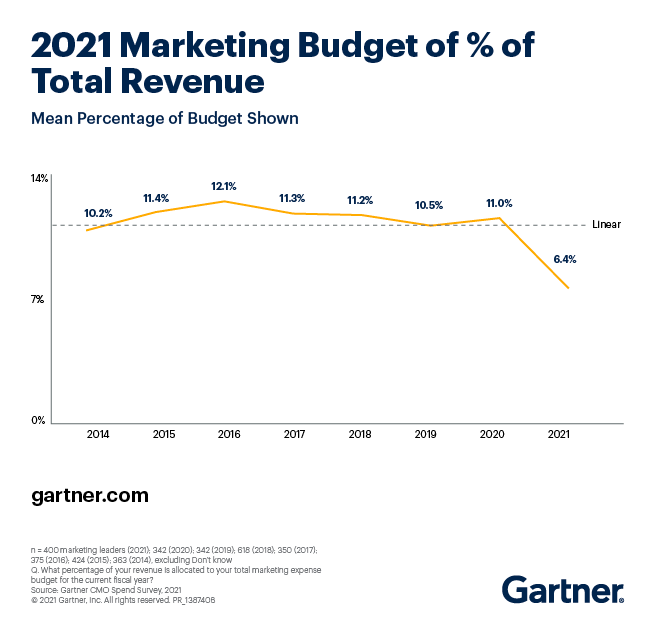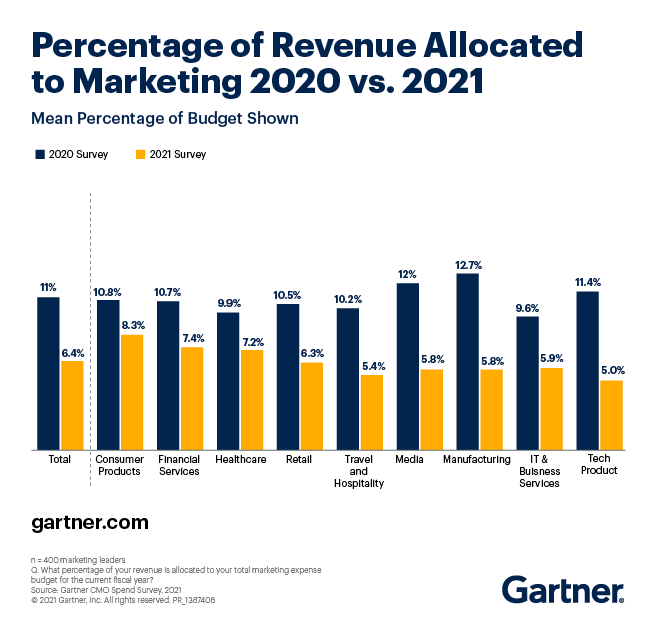Topics:
News Executives and Leaders Content and Inbound Marketing 101 Getting Started with They Ask, You AnswerSubscribe now and get the latest podcast releases delivered straight to your inbox.
Gartner: Slashed 2021 marketing budgets increases in-house ownership

By Liz Murphy
Jul 30, 2021

Gartner marketing budget data (at-a-glance)
- To say the COVID-19 pandemic took a toll on company budgets across every virtually single department (including marketing) would be an understatement of downright hilarious magnitude.
- Although unpleasant at the time, CMOs and other marketing leaders anticipated that their budgets would "bounce back" this year. Yes, they understood why the 2020 cuts were necessary, but certainly, it would be temporary, right?
- Well, according to new data from Gartner this month, it wasn't temporary. Across every single industry, marketing leaders are reporting their marketing budgets have been slashed to record lows in 2021 – dropping from 11% of revenue to 6.4% (almost half).
- What's fascinating from this report is how marketing teams have responded and adapted: "... this continual change indicates significant in-housing activity, as CMOs reimagine the capabilities that can be supported by their internal teams."
- The irony is that this whole concept of "in-housing" and full ownership is one of the core foundational principles of the They Ask, You Answer framework, which is a proven approach to drive more sales with inbound marketing.
- As Marcus Sheridan has said, "When companies approach [content marketing], and they feel like they are incapable of handling it themselves, they are tempted by the allure of an agency. It sounds like the perfect idea: 'I don’t really have to lift a finger other than to write a check and I will see great results.' And the truth is, that was probably true — 10 years ago."
- So, if you're a marketing leader trying to do inbound marketing with the help of an outsourced agency, I want you to hear me when I say this – even if it's only been recent budget cuts that have made you consider cutting off agency relationships, is this something you should have been doing all along?
That is where our conversation begins today.
How bad are the marketing budget cuts, really?
I could sit here and say, "Trust me, it's as bad as every Washington Football Team season since Dan Snyder took over as owner" until I'm blue in the face, but I'm just going to let the numbers speak for themselves:

Because these numbers are very bad.

And they tell a clear story that no industry was immune.
Bottom line, companies that were able to weather the storm of the COVID-19 pandemic last year did so with lots of pivoting and sacrifices, right? And we didn't complain. We were all facing unprecedented circumstances, so we all had to innovate and band together and, of course, do more with less.
Related: Why outsourcing your content is not a smart move (+ video)
According to this report, however, marketing leaders didn't think this would extend into 2021, as we have seen restrictions lift and some remnants of "normalcy" return:
“Despite facing in-year budget cuts in 2020 due to the pandemic, most CMOs expected budgets to bounce back in 2021.”
Unfortunately, I think we can all agree with Gartner's assessment that this "optimism was misplaced."
Companies now challenging themselves to do more in-house
When I was an account manager at an inbound marketing agency when I started out in the industry, we often reminded each other:
"Remember, we have to always be showing how valuable and indispensable we are to our clients. Because the moment they're feeling any sort of instability in their budget, we'll potentially be one of the first on the chopping block as an outsourced agency."
Flash forward to today, and the pandemic has proven that to be true:
“CMOs report that 29% of work previously carried out by agencies has moved in-house in just the last 12 months alone. The focus of in-housing is changing as well – with brand strategy, innovation and technology, and marketing strategy development making up the top three capabilities areas CMOs are moving to internal teams.”
On the one hand, I'm a marketer by trade, so I am crushed by the news that marketing leaders are potentially not getting the buy-in and financial support they deserve or need from their companies. Often, marketing isn't looked at as a revenue driver, it's considered an expense. And I'd be willing to wager a lot of this slash-and-burn marketing budget news is related to that.
On the other hand, while this news sucks, is this just forcing many companies to be doing what they should have been doing all along?
Inbound marketing is the perfect example of when outsourcing isn't the right choice
Outsourced agencies come in a wide variety of shapes, sizes, and specialty areas. But one of the most common ways companies outsource their marketing – especially if they're practicing inbound marketing – is by outsourcing content creation along with other critical inbound marketing activities.
🔎 Related resources:
- Outsourcing is broken: Rethinking the client-agency relationship
- Why you need a content manager on your marketing team
As Marcus Sheridan, best-selling author of They Ask, You Answer, has repeatedly talked about the serious problems of outsourcing inbound marketing and content creation:
"If you want to be that source that is trusted and sought out by buyers, you need content on your website — a lot of it. If you want that content to bring in traffic, gather leaders, and help salespeople close deals, you need it to be produced in-house." (Source)
"The bottom line is this — the traditional agency-client relationship isn't set up to produce the quality and quantity of content you need to win business. The cheaper, smarter, more genuine, and more effective approach is to insource your content creation and own the process." (Source)
"Ultimately, the question of producing your own content versus having someone else do it for you is much like the principle of the artist. Not until the artist is holding his or her own paintbrush can he truly produce a masterpiece. The same is true for any company wanting to become a thought leader in the digital age." (Source)
That's why one of the core concepts of the They Ask, You Answer approach to inbound marketing is bringing those content and inbound marketing activities in-house.
🔎 Related resources:
- What is the They Ask, You Answer approach to inbound?
- They Ask, You Answer fundamentals with Marcus Sheridan
Outsourcing your company’s content creation to a digital marketing agency can seem like a smart solution if you have the desire to hit the ground running with inbound marketing but lack the resources. But entrusting the creation of your content to another company often comes at a cost.
- First, your content is the soul of your business. It is virtually impossible for an agency to create content that authentically and accurately captures your brand, your core values, and the depth of your subject matter expertise when they aren’t embedded in your business.
- Second, your potential with inbound will always be stunted by the restrictions of your agency relationship. For example, if you see that you need to ramp up content production to get better results, you won’t be able to just do it. You’ll likely need to enter into lengthy conversations and drastically increase your budget.
That's why, at IMPACT, one of the first steps we have companies take in their They Ask, You Answer journey is to hire an in-house content manager to lead their efforts, instead of turning to an agency to create that content.
Parallels to the rise of video and the pandemic
In my keynote for Video Sales and Marketing World this year, I said the following:
"Crises throughout history, particularly on a global scale, have proven time and again to be incubators for tremendous innovation. We take massive leaps forward as a society when we’re backed into a corner, not when things are easy ...
"For example, zippers were actually invented in 1851 by Elias Howe, but it was World War I that cemented the invention as indispensable when they were used for money belts for sailors who didn’t have any pockets on their uniforms. In fact, in 1917 alone, 34,000 zippers were commissioned for use on money belts by the U.S. Navy.
"And then there’s video. Much like zippers before WWI, video has been around for a while.
"Then, as we all know, the pandemic struck. And everything changed. Business leaders around the world were forced to innovate new ways to avoid complete catastrophe. And sales teams had no choice but to immediately embrace virtual selling and video, by transferring their in-person sales conversations, brick-and-mortar purchasing, and on-site showroom experiences into a video environment."
Seriously, for more than a decade, marketing and sales teams have been beaten over the head with statistic after statistic telling us how powerful and profitable video would be, but we stayed the course with our mostly video-less strategies.
🔎 Related resources:
- After COVID-19, the one thing not going "back to normal" is video
- Video sales and marketing strategy for businesses
Well, until the pandemic forced us, kicking and screaming – much like a 12-year-old boy being forced to go into a Crate & Barrel with his mom – to finally use video in sales and marketing because we had no other choice.
I'm genuinely wondering if we're at a similar inflection point now with bringing other aspects of our marketing in-house. In a pre-pandemic world, when we had more cash in our budgets, we could take the easy way out with agencies – but that's not the reality we live in anymore.
And, if we're being honest with ourselves, how much should we have been relying on outsourced agencies in the first place?
If you're a company that looks to inbound marketing as a means to drive traffic, leads, and sales in this post-pandemic digital age, the answer is now clear. Yes, our marketing budgets may be smaller, but even if we still had those pre-pandemic marketing dollars in our pockets, turning to an agency to own such mission-critical parts of our strategy like content creation is not the answer.
Companies that drive truly remarkable growth with their inbound marketing understand they must produce their content in-house.
As Marcus Sheridan said in They Ask, You Answer so eloquently, if you want to truly stand out from your competitors in the digital age, you must pick up your own paintbrush. If you want your content to authentically possess your brand's soul and depth of knowledge, you must commit to becoming the artist behind your own masterpiece.

